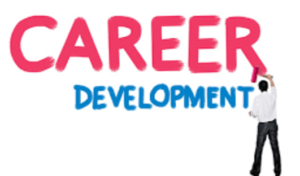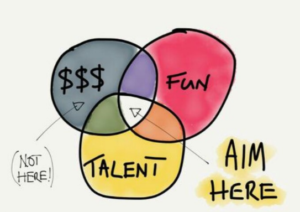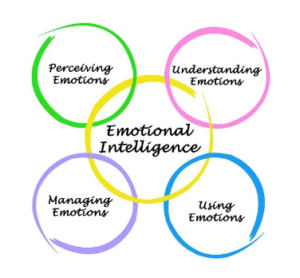Far too many professionals today look to their managers to manage their career path and trajectory when in fact; this is yours and yours alone to manage. It’s so easy to get caught up in our work that we lose sight of our career. So, what can you do if your career development is not succeeding?

Check out our thoughts on team leverage.
Is there a secret to why some people have successful careers and others don’t? Research shows that IQ or abilities often have no cause and effect relationship. Certainly, the socio-economic background does have a significant influence but no guarantee.
You are accountable for your success. As such, it is your responsibility to discover your special gifts, attributes, and capabilities that can give you a competitive edge and the greatest probability to have a flourishing career.
Career management requires quality networking, being in the right place at the right time, earning a voice at the table, knowing your unique value proposition and how to use it, managing your personal brand, being influential – to name a few essentials. But in the end, all of these factors require one important thing: a personal commitment to manage and invest in your career the right way.
On the surface, this sounds simple – but it is quite time-consuming and requires strategic thought and planning. Making an investment in your career requires you to know what you should invest your time, money and resources in.
Similarly, when you invest in your career and personal development, you must do it with the end game in mind. For example, what performance improvements and career advancement outcomes do you expect, and when will you be able to see favorable financial results and lifestyle changes as a result of your investment?
I have seen too many people waste time and money on making career investments that don’t align with their passionate pursuits and ultimate career ambitions. They can’t see the opportunities around them that they can effectively seize for their advancement and personal satisfaction.
To invest properly in your career, you must know yourself extremely well. Knowing yourself requires you to understand the factors that positively inspire you to achieve something substantive and relevant – with passion – every day.
For some people, this takes a long time to discover. For others, they know themselves well enough to make good career investment decisions.
Here are eight ways your career development may not be succeeding:

No well developed, measurable goals
The key to getting what you want is knowing what you want. You must know what you want out of your career, and you should be clear about these goals with your manager and your mentor. These goals are also great ways to measure your progress through the year and years in your regular performance reviews.
Study the trends that are shaping your industry and niche. Pay attention to what the experts are saying.
Know your strengths, and which skills are marketable? Take an assessment test if you have to. Map a path to get to where you want to go in your career, knowing that you will have to make changes as the work environment changes. Based on what you are seeing and hearing, what skills do you have to acquire to become more valuable to yourself and future employers? Acquire those skills and make learning a part of your day.
Career development … limited feedback loop
The hardest thing to do is to hear honest feedback because it isn’t always positive. But, the ability to listen to all feedback and adjust accordingly is what will elevate your career. Be sure you are open to the good, the bad and the ugly feedback. This will help you adjust your work and your goals.
Try to imagine how your boss might describe you to someone. If the description is less than fabulous, consider why and then kick your butt quickly into gear.
Start going to meetings with big, bold ideas, give your full attention to projects, volunteer for new assignments or stuff your boss is too busy for—and then knock it out of the park. Get a new haircut and a couple of great outfits to signal that you have your mojo back.
And don’t be afraid to verbalize your intentions to your boss. I got a note from a staffer after she received a promotion, and she ended it with the phrase, “Someday I want to be you.” It was the first time I realized how fiercely ambitious she was—and I liked that.
Career development activities … not seeking new experiences
When a new project comes up, and it aligns with your goals, raise that hand. Let your manager or HR team know that you want to learn some new skills or gain new, more advanced experience. Be clear on what you can offer to the project and get involved.

Weak in building your network
Cultivate networks inside and outside the organization you work for, and both online and offline. Find ways to be of service to the people in your network. It could be as simple as introducing them to each other or sending them articles and other information that are meaningful and valuable to them. Attend worthwhile events to continually build and expand your network of contacts. When you hear of an event that’s worth attending, pass on the information to people who might benefit from attending as well, and let them know why you thought of them.
When you’re starting out, you network out of necessity to find a job. But further along in your career, it’s easy to let networking fall off because of time constraints. You need to keep it going at full throttle.
Ahead of any event, research key people who might be there. Approach them with specific talking points. (For instance, start with “Your article in X trade publication was terrific” and then ask a question about it.) Join conversations by first listening to what’s being talked about and then being inquisitive. Later, send new contacts links to info relating to what you discussed.
Not working with a career mentor
A coach holds you accountable and forces you to manage your career so that you won’t lose momentum.Managing your career is important because it encourages you to take proactive steps to make better choices about your career, and the seven strategies offered above will get you started.
Staying focused can be difficult with so many different responsibilities to manage. This is why most people lose momentum when attempting to advance their careers. Most people start and stop the career management process – finding it difficult to manage their time.
Make career management a new best practice; a process that becomes an embedded part of your daily activities, goals, and objectives. If possible, invest in a career coach to increase your commitment levels and hold yourself accountable. Today’s competitive landscape requires you to stay on track by investing in someone that can provide you with the tools and perspective to keep you focused.
Not taking responsibility for managing your career
Don’t wait until you’re fired, laid off, burned out or fed up to revitalize your career. Manage your career on an ongoing basis, particularly through the good times. This reflects a belief you should embrace—“take responsibility for everything that happens in your life;”
Not building on strengths
Do what you’re best at, and what you have a passion for. Don’t spend an inordinate amount of time trying to make your weaknesses strengths;
Become increasingly aware of your natural strengths that allow your skill sets and capabilities to thrive and make the commitment to invest in them. For example, if you are a good negotiator, never assume that your technique doesn’t require fine tuning. Take a negotiations class, enhance your abilities and then put them to work more frequently.
To get your mindset in the right place, try this: the next time you are in a meeting, carefully observe your colleagues. Notice the dynamics in the room – and begin to ask yourself: what are other people doing to invest in the betterment of their careers?
The ultimate prize is to find happiness in your career and your work by fueling your strengths and passion.
Not seizing the initiative
Never stop learning. This begins by investing your time to acquire the right intelligence and know-how that will accelerate your career advancement. For example, most people want to build their personal brand – yet don’t invest in the process of developing one and thus miss opportunities along the way.
Never assume that you don’t need to get smarter, wiser and more strategic about how to better manage your career. Be proactive. Get to know the goals the industry you are serving desires to achieve and how you can contribute. Build relationships with key thought leaders. Identify the best executive search firms that can support the career path you seek – and get to know what your direct competitors are doing to secure the position(s) you may be targeting.
The bottom line
There are no magic potions or formulas for career success. It requires sustained effort, street smarts, and insightful strategies, much like the focus of successful organizations.
For instance, attend a speech by someone in your industry or write a blog about your field. Go on YouTube to hear a motivational speech by someone wickedly successful, like Facebook’s Sheryl Sandberg. And use this kind of time, too, to develop your “Big Mouth list” (all the people you email with important professional news about yourself).

Need some help in capturing more improvements for your staff’s leadership, teamwork, and collaboration? Creative ideas in running or facilitating a team or leadership workshop?
Call today for a FREE consultation or a FREE quote. Learn about some options to scope your job.
Call Mike at 607-725-8240.
All you get is what you bring to the fight. And that fight gets better every day you learn and apply new ideas.
When things are not what you want them to be, what’s most important is your next step. Call today.
Test. Learn. Improve. Repeat.
Are you devoting enough energy continually improving your continuous learning?
Do you have a lesson about making your learning better you can share with this community? Have any questions or comments to add in the section below?
Mike Schoultz is the founder of Digital Spark Marketing, a digital marketing and customer service agency. With 40 years of business experience, he blogs on topics that relate to improving the performance of your business. Find them on G+, Twitter, and LinkedIn.
Digital Spark Marketing will stretch your thinking and your ability to adapt to change. We also provide some fun and inspiration along the way. Call us for a free quote today. You will be amazed how reasonable we will be.
More reading on mentoring from Digital Spark Marketing’s Library:




